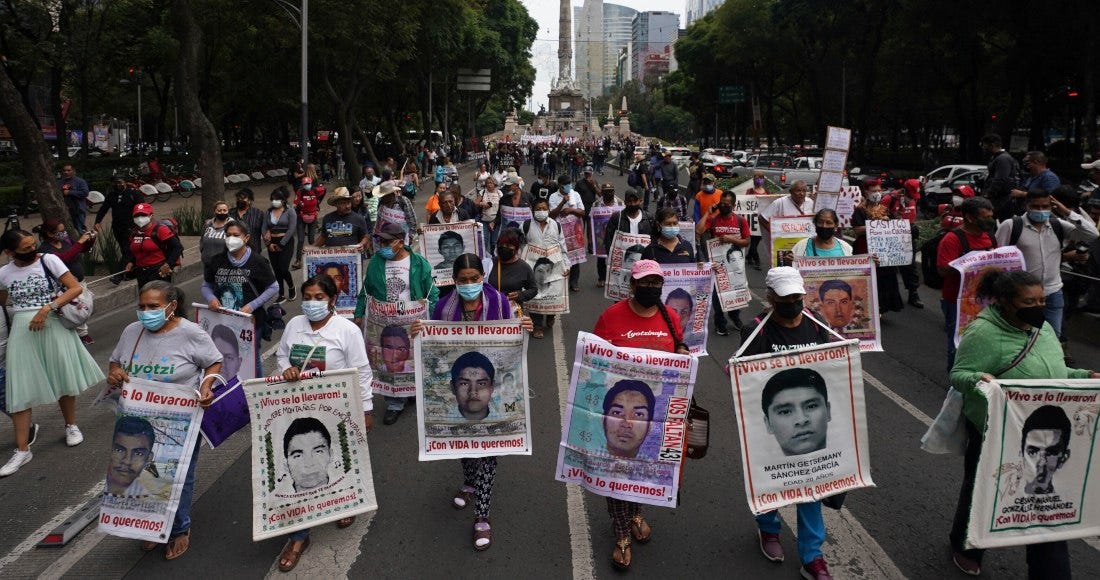La Semana: Monday, Oct 3
The week in the "implosion" of the Ayotzinapa case
Welcome to a Monday edition of The Mexpatriate.
In today’s brief newsletter:
Ayoztinapa update: canceled warrants, a resignation and leaked information
I will be sending out another edition during the week, stay tuned!
Please share your comments, feedback and questions, and feel free to forward this to anyone who may be interested. You will find all sources linked to directly in the body of the text.
Ayoztinapa update: warrants withdrawn, a resignation and leaked information
Since my last entry about the Ayotzinapa case on September 4, there have been some significant developments in what appears to be an implosion within the government, as various institutions attempt to reckon with the prosecution of a “state crime” and the pursuit of the truest “truth” about what happened to the 43.
The “historical truth” of Peña Nieto’s administration has been superseded by a tangled web of evidence and conflicting narratives following further revelations from the COVAJ (Commission for Truth and Access to Justice) report, as revealed by journalist Peniley Ramírez at Reforma in a column entitled “Ayotzinapa: the coverup”, published on September 24. Ramírez says an anonymous source leaked the full, unredacted version of the report to her because said source thinks it is “vital for these new clues to be investigated”. Ramírez narrates the communication amongst members of the Guerreros Unidos with members of law enforcement and the military, including gruesome details on how the students were murdered and their remains disposed of at various sites. She goes on to explain that by September 29, 2014, as public outcry over the missing students became louder in the weeks, the chats detail the beginning of the coverup: the decision to exhume bodies that might be discovered by the searching families and to move them to an army base, where “no one would get in”.
Undersecretary for Human Rights, Alejandro Encinas, the head of the Ayotzinapa commission, called the leak “irresponsible” and “disrespectful” to the families of the victims and has said an investigation will be opened to find and prosecute the source. Meanwhile, the special prosecutor for the case, Omar Gómez Trejo—who was conspicuously absent during the arrest of ex-attorney general Murillo Karam in August—announced his resignation on September 27. Gómez’s investigative unit, formed under the auspices of the commission in 2019, went from having 13 police officers assigned to zero by the end of August. The federal attorney general’s office (FGR) sidelined the special prosecutor and his team, announcing the withdrawal of 21 of the 83 arrest warrants issued; 16 of these warrants were for military personnel. On September 28, a judge granted a temporary suspension of the charges against ex-attorney general Jesús Murillo Karam (torture and forced disappearance) in what could be a signal of the unraveling of the case against him.
On September 24, Jorge Fernández Menéndez from El Heraldo interviewed the retired general José Rodríguez Pérez, who is being held on charges of organized crime at a military prison in Mexico City; thus far, Rodríguez is the highest-ranking member of the military to be arrested in relation to the Ayotzinapa case. The general emphatically proclaimed his innocence in the interview, claiming that the accusations against him contained in the COVAJ report—which alleges he ordered the execution of six of the students—are baseless and “vile”. Rodríguez asserts that the prosecutors’ only evidence is the testimony of state witness (and former member of the Guerreros Unidos gang), Gildardo López Astudillo, “El Gil”.
In the midst of this flutter of activity, the GIEI (Interdisciplinary Group of Independent Experts) issued an updated report on September 29. They emphasized that the text message screen captures contained in the COVAJ report have yet to be independently corroborated using forensic analysis. They requested an extension of one more month to continue their work on the case.
In summary, I think there are two important takeaways: we must not forget this case is just one of thousands, and at the same time, that it has particular significance for this administration, and for the country. While AMLO enjoys public popularity and his party continues to gather clout, this eight year-old tragedy is a crucible: Ayotzinapa represents his promise as a harbinger of change, but it could just as easily symbolize his failure. In the words of the president himself last week: “we have made the commitment to clarify this situation, I made that promise to the parents, but also to the people of Mexico.”



"Amazing"....thanks for this work.. "And O what a tangled web we weave, when first we practce to deceive"